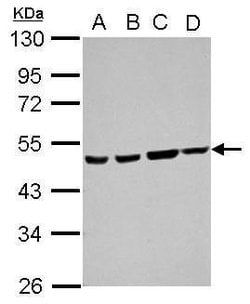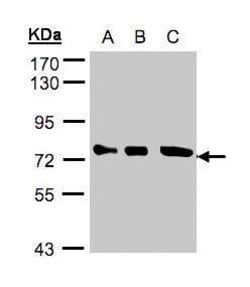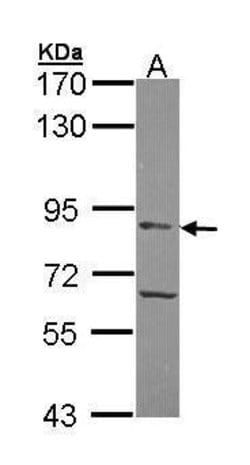ATXN10 Polyclonal Antibody, Invitrogen™
Manufacturer: Thermo Scientific
Select a Size
| Pack Size | SKU | Availability | Price |
|---|---|---|---|
| Each of 1 | PIPA528248-Each-of-1 | In Stock | ₹ 46,502.50 |
PIPA528248 - Each of 1
In Stock
Quantity
1
Base Price: ₹ 46,502.50
GST (18%): ₹ 8,370.45
Total Price: ₹ 54,872.95
Antigen
ATXN10
Classification
Polyclonal
Conjugate
Unconjugated
Gene
ATXN10
Gene Alias
AI325283; ataxin 10; ataxin 10 homolog; ataxin-10; ATXN10; Brain protein E46; brain protein E46 homolog; C77170; E46; E46L; HUMEEP; Neuronal beta-catenin-like protein; Sca10; spinocerebellar ataxia 10; spinocerebellar ataxia 10 homolog; spinocerebellar ataxia type 10 protein; Spinocerebellar ataxia type 10 protein homolog; TEG-169; testis expressed gene 169; Tex169
Host Species
Rabbit
Purification Method
Antigen affinity chromatography
Regulatory Status
RUO
Gene ID (Entrez)
25814
Content And Storage
Store at 4°C short term. For long term storage, store at -20°C, avoiding freeze/thaw cycles.
Form
Liquid
Applications
Immunohistochemistry (Paraffin), Western Blot
Concentration
0.78 mg/mL
Formulation
PBS with 1% BSA, 20% glycerol and 0.01% thimerosal; pH 7
Gene Accession No.
Q9UBB4
Gene Symbols
ATXN10
Immunogen
Recombinant fragment corresponding to a region within amino acids 1 and 393 of Human ATXN10
Quantity
100 μL
Primary or Secondary
Primary
Target Species
Human
Product Type
Antibody
Isotype
IgG
Description
- Recommended positive controls: 293T, A431, HeLa, HepG2, U87-MG, SK-N-SH, IMR32, SK-N-AS
- Predicted reactivity: Mouse (82%), Rat (85%), Rhesus Monkey (98%), Chimpanzee (99%), Bovine (87%)
- Store product as a concentrated solution
- Centrifuge briefly prior to opening the vial
- The autosomal dominant cerebellar ataxias (ADCAs) are a clinically and genetically heterogeneous group of disorders characterized by ataxia, dysarthria, dysmetria, and intention tremor
- All ADCAs involve some degree of cerebellar dysfunction and a varying degree of signs from other components of the nervous system
- A commonly accepted clinical classification (Harding, 1993) divides ADCAs into 3 different groups based on the presence or absence of associated symptoms such as brainstem signs or retinopathy
- The presence of pyramidal and extrapyramidal symptoms and ophthalmoplegia makes the diagnosis of ADCA I, the presence of retinopathy points to ADCA II, and the absence of associated signs to ADCA III
- Genetic linkage and molecular analyses revealed that ADCAs are genetically heterogeneous even within the various subtypes.



